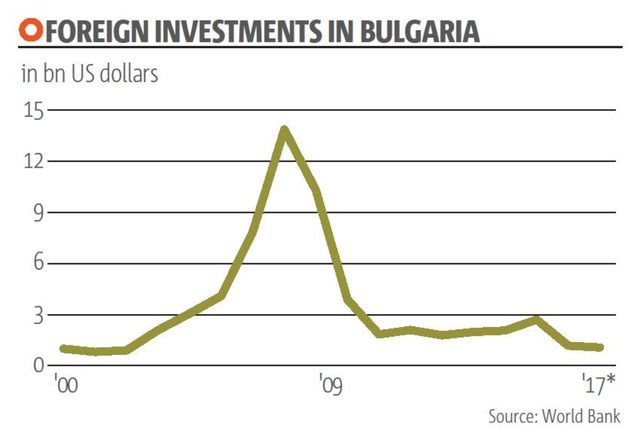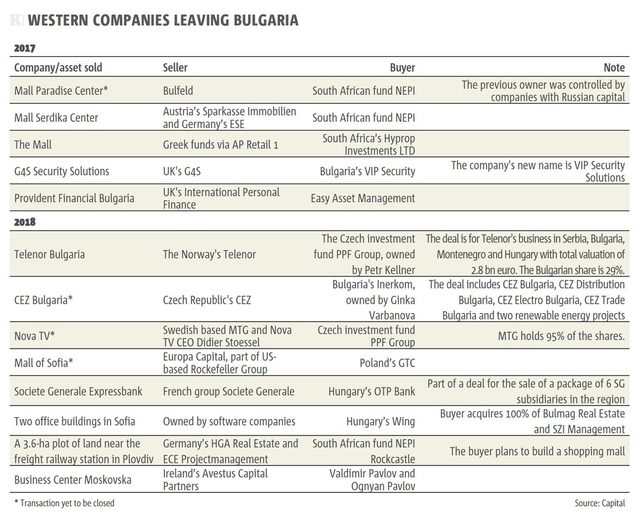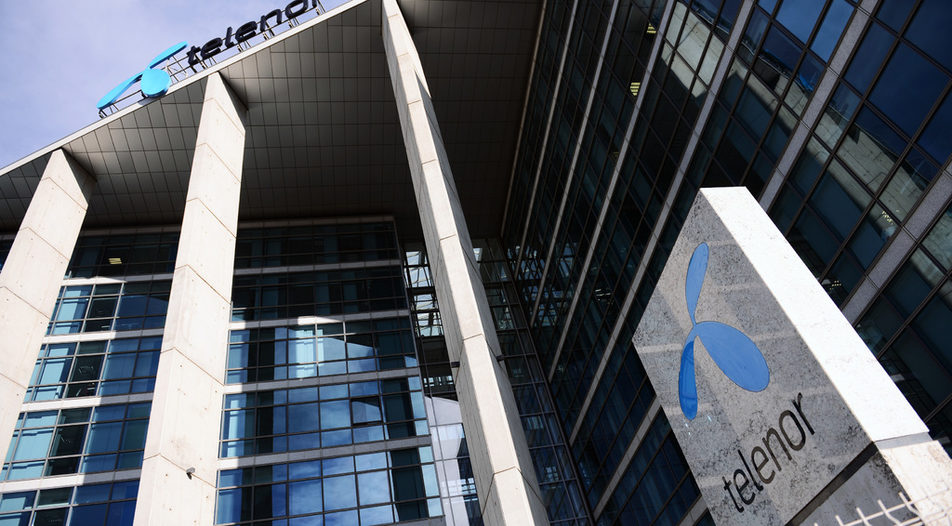• The tendency has not still affected industrial and IT companies working for foreign markets.
They are leaving. The Scandinavian Telenor and MTG, the French Société Generale, even the Czech CEZ Several recent large-scale transactions show a clear-cut tendency - Western companies are leaving Bulgaria. More often than not, they explain their decision with the fact that the small Bulgarian market is hindering their expansion, and sometimes - with the actions of the public authorities. There are slight variations - some (Telenor) are looking for higher margins on other continents like Asia and Africa; for others (Société Generale) it is a decision related to the region, namely the bank has concluded that if it is not among the leaders in the Central and Eastern European banking sector, its presence is not worth it. The change of the business model and the withdrawal from Eastern Europe have cut down Western investments in television channels. The energy sector is suffering the most as the few European companies on the Bulgarian market are leaving the country. And the reason is that the relentless state pressure has made conditions in the sector intolerable.
Buyers have changed too; now they tend to come either from the ex-Socialist bloc and Central Europe in particular, or from exotic destinations as in the case of the South African property funds. Naturally, local companies refuse to stay idle and are taking part in most transactions.
The "Bulgarization" is not as widespread as it was during the global economic crisis ten years ago. Heavy indebtedness at the time led to selling assets cheap, usually to the team Tsvetan Vassilev - Delyan Peevski backed up by the soon-to-collapse Corporate Commercial Bank. Now the sales are not panic-driven; the moment is indeed almost perfect for the sellers - money is cheap and the companies' valuations run high.
Investors are quite reticent as to their motives for leaving Bulgaria. Yet, their tendency to leave and have their place taken by Eastern buyers has been confirmed by business consultants with close knowledge of the recent M&A deals in Bulgaria.
Luckily, there are exceptions to the rule. The manufacturing companies oriented towards large foreign markets have preserved their good margins. They, and the IT sector, are almost independent of the public authorities and the corrupt local environment.
Statistically, the tendency is not easy to spot. Investors' background is somewhat camouflaged as buyers choose destinations like the Netherlands or Luxembourg where taxation is lax.
'Our data shows that in Eastern Europe an increasing number of local investors - as a percentage of all investments - enter the market of business real estates, and the economy as a whole,' Colliers International analyst Marc Robinson, an expert in macroeconomic analyses of Central and Eastern Europe, commented for Capital. His calculations demonstrate that prior to the crisis (2000 to 2008-2009) direct foreign investments in the region had amounted to 15-40% of the total investments, while the ratio in the next period reads 0-20%. Those foreign investments, says Mr. Robinson, have most probably been substituted with local investments and EU funds; the transactions between foreign companies and local buyers may also have played a role.
"With the exception of shopping malls, the M&A market is weak. Strategic international actors are simply not present here", Dimitar Uzunov, director of Bulgarian consulting company Entrea Capital, concluded last year. The consultants did not register any change in 2018, some even consider the trend to be getting stronger.
Reason #1: Bulgaria's not big enough for me
Thirty years after it abandoned socialism and returned to democracy and market economy, Bulgaria seems to have lost its attractiveness to foreign investors.They used to be lured by the universal optimism regarding the future of Eastern Europe, the admission into the European Union and privatization. These particular incentives are nearly depleted now, especially in retail and services. For a decade now the retail market for instance has been redistributed and no Western supply chains have ventured to expand to Bulgaria. Just the opposite, almost all foreign DIY chains and some European food chains have left. They all explain their decision with the fact that the market is small and overcrowded, and it is not worth staying if you are not amongst the top two or three companies.


The same applies to the reasons behind the withdrawal of some small Western insurance companies. A big European or American bank has not set sights the Bulgarian market for over a decade now. The recent sales of United Bulgarian Bank, Victoria Bank and Municipal Bank, and the expected sales of Société Generale Expressbank and Piraeus Bank show that interest comes either from local buyers or from foreign entities already present on the market.
Even in the telecommunications sector, where the margins are high, Norway's Telenor has decided to leave. The operator had reached an EBITDA (earnings before interest, taxes, depreciation and amortization) margin of 37-38%; the same indicator for the rapid growing Asian markets like Pakistan and Bangladesh, for comparison, is 52-57%.
Austrian, German and American companies are leaving the real estate sector in Bulgaria, even though its profitability is 7-8% or several points higher than in the rest of Europe. New, predominantly South African buyers step in; they find the risk and returns in Bulgaria attractive compared to the high inflation and instability in South Africa. Investors from Poland, Hungary and Serbia are starting to take interest in the minor transactions.
Reason #2: The state is standing in my way
There are other, more alarming motives to leave Bulgaria - the brutal interference of public authorities, the weak judicial system and the challenging business environment as a whole. The last survey among members of the German-Bulgarian Chamber of Industry and Commerce once again points to the lack of law enforcement and corruption as the greatest issues in Bulgaria. The survey has been carried out since 2005, and it has traditionally found the fight against corruption and crime inadequate.
The interference is most evident in the energy industry. The sector is heavily regulated, and the supervising commission while independent on paper, has been subservient to the ruling elite for years. In the context of ever changing legislation and constant threats of suspension of licenses and fines, it is hardly surprising that first E.ON, and now CEZ are leaving the electricity supply and distribution business. An unstable environment for investors has been created in the renewable energy sector where wind farms and solar power plants usually become local property. AES and ContourGlobal, the U.S-based investors in two Bulgarian coal-fired power plants, are operating under the constant threat of having their contracts terminated.
Construction is yet another sector conspicuously lacking Western investors. Bulgaria is commissioning billions of euro for new highways and railroads, and yet no European giant turns up at the auctions. Suspicions that the funds have already been distributed, i.e. corruption, have led to a situation where a couple of protégés of the ruling elite are always winning, whilst the foreign candidates are forced out of the tenders.
Media is another sector Western investors are abandoning en masse. The German owner of 24 Hours and Trud news dailies has left, and so have several Western European owners of radio groups; the sale of the two major private TV channels is currently underway. Western media groups are disposing of their Bulgarian investments, and are replaced by local or regional actors with power rather than business on their agenda. The sale of Nova TV is somewhat different, with the PPF Group of Czech billionaire Petr Kellner endeavoring to achieve synergy between Telenor's telecommunications business in Bulgaria, which Kellner is also buying, and TV content. Still, it is possible that a resale to a local or an Eastern buyer could follow.
The future
The decline in the number of Western investors can hardly be stopped. The market will remain insignificant since Bulgarians are not expected to get richer overnight. The government shows no signs of introducing changes that will attract new investors, for example in the educational system. Economic analysts recognize the risk of ongoing oligarchization of the business environment.
The potpourri of local investors and their new Eastern European peers is likely to lack the motivation to play by the rules, since they are used to rely on their close ties with the political elite. All the good practices, fair competition and the access to the newest technologies are consequently being lost.
The Bulgarian economy is also running the risk of opening the road to detrimental influences and dependencies. The energy sector, now almost entirely dependent on Russia, may be followed by other key sectors as well. The biggest investor to be, Petr Kellner, for instance, has strong business ties to China and Russia and may as well sell his newly acquired Bulgarian assets to some of his partners there. The Russian link of the Hungarian owner of DSK Bank - OTP Group, which would become the second biggest bank in Bulgaria if it acquires the Bulgarian branch of Société Generale, is also alarming.
All this is taking place in the context of an economy currently on the go; if the alarming tendency is not balanced by attracting strategic investors in the industrial and technological sector, the exodus may accelerate during the next economic downturn.
Yet, on a lighter note, the diversification of owners is not necessarily a bad news as long as the market is kept regulated and the state machine ceases catering to the needs of the small circle of its protégés
Naturally, tendencies are not fully predictable - after Western investors leave, companies of their rank might decide to enter the country and fill in the vacancies.
FINDING AND RETAINING TALENT IS BECOMING MORE DIFFICULT
What was the major event in Bulgarian business in the last quarter and why?For me the most important and major event in the last quarter was the Bulgarian presidency of the Council of the EU. This event increased significantly the number of visitors to Sofia which had a positive impact for the businesses like hotels, restaurants and catering services. As a wholesaler addressing those businesses I was happy to observe the economic activity built around this major change.
At the same time this event was major is the fact that Bulgaria had immense exposure to foreign delegates and people. The culinary culture, the history and the natural beauty of Bulgaria has been communicated at the highest levels which for the long run is a great investment.
On the other hand, I would like to highlight the difficulty of finding and retaining talent being more prevailing in the last quarter. The challenge of finding adequate labor force was also an important influencer for the business owners.
What do you expect to be the next major development in Bulgarian business in the forthcoming quarter and why?
The next quarter which is the summer season will be very important for the businesses which are correlated with tourism sector. I expect a very good summer season with nearly 5-7% more number of tourists visiting Bulgaria. I hope on the other hand we will be able to change the image of Bulgarian summer holidays from cheap to more elaborated experience.
Atila Yenisen has been CEO of METRO Cash & Carry Bulgaria since August 2016. In 2000 Atila joined the wholesale industry as a category manager at Metro Cash & Carry Turkey. Since 2006 he was consequetively reponsible for Metro Cash & Carry business in Pakistan, Spain and Portugal.
• The tendency has not still affected industrial and IT companies working for foreign markets.












